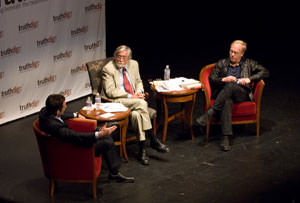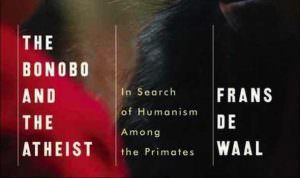Sam Harris Strikes Back
The following is Sam Harris' response to Chris Hedges' essay, "I Don't Believe in Atheists." Last week the two Truthdig contributors battled one another over the issues of religion and politics during a live debate in Los Angeles. While they both agree on the dangers posed by religious fundamentalism in America, their views on religion in general differ greatly, as you will soon read.
Editor’s Note: The following is Sam Harris’ response to Chris Hedges’ essay, “I Don’t Believe in Atheists.” Last week the two Truthdig contributors battled one another over the issues of religion and politics during a live debate in Los Angeles. While they both agree on the dangers posed by religious fundamentalism in America, their views on religion in general differ greatly, as you will soon read. Click here for full debate coverage.
I am hopeful that the editors at Truthdig will eventually post the unedited video/audio of my debate with Chris Hedges to the website. Once these files are available, readers will be able to judge for themselves which of us made more sense on the subject of religion. I would, however, like to offer a few remarks in the meantime.
As I mentioned briefly during the live event, Hedges misrepresented my views on several topics in his opening remarks. Rather than do a little fact-checking after the debate, he chose to make these distortions indelible in his essay, “I Don’t Believe in Atheists.” I have long had an article on my website entitled “Response to Controversy” which addresses many of the spurious points Hedges raises, and I have made a few additions since we met at Royce Hall. The article can be found here.
Beyond putting out these small fires, I would like to briefly address the main claims that Hedges makes in his essay:
Real religion has nothing to do with superstition, irrational beliefs, or tribalism. God is not an anthropomorphic deity; He is just “the name we give to our belief that life has meaning.”
It should be immediately clear to all readers that Hedges is simply dodging the fact that millions (probably billions) of people practice religion in the naïve, anthropomorphic, and superstitious forms he would rather not defend. By saying that faith is really something other than the irrational belief in magic books, virgin births, the power of prayer, etc., Hedges ignores how pervasive the problem of religious irrationality is. As many readers will recognize, this is one of the sins of religious “moderation” that I discuss in “The End of Faith” — and I really could not have hoped to find a more lumbering, bellicose, and sanctimonious perpetrator of this obscurantism than Chris Hedges. According to recent polls, 53 percent of Americans think that the universe is less than 10,000 years old and 59 percent believe that Jesus will one day return to Earth wielding magic powers — and yet, religious moderates like Hedges invariably accuse me of “caricaturing” Christianity whenever I criticize these beliefs. Hedges appears to be playing a highly disingenuous game of hide-the-ball with the articles of faith, and it is a game that keeps the world safe for religious lunacy; it also prevents a truly rational approach to spirituality from emerging in our discourse.
Monotheism has been historically indispensable in laying the ground for individualism and the modern concept of human rights.
While this point is surely debatable (and probably false), even if true, it would not (even slightly) suggest that the biblical God exists. Nor would the historical usefulness of monotheism suggest that monotheism is a benign force in the 21st century. In my opening remarks in our debate, I addressed the notion that religion is (or has been) useful. Nothing that Hedges said subsequently (or wrote in his essay) indicates he understood what I was talking about.
There is a difference between the irrational and the non-rational — and the latter is the basis of our spirituality.
I have no problem acknowledging that there is a distinction between rational thought and other features of our subjectivity that are “non-rational.” The taste of chocolate is non-rational (without being irrational), as is almost every other sensory or emotional experience. We can, however, rationally discuss what we know about chocolate — its chemical composition, where it comes from, how we cultivate it, etc. — and we might one day fully elucidate the underlying neurology of taste. The same rational mode of discourse could, in principle, accommodate our “spiritual” experiences and our ethical intuitions as well. One of the greatest impediments to our making progress on this front, however, is the fact that people like Hedges continue to demand that a special strain of irrationality called “religion” remain sheltered from criticism.
Finally, many of the comments posted in response to Hedges’ essay have used the fine art of selective quotation to make me appear to hold positions which I do not hold. Hedges, in part, is responsible for this, having led by example. I advise readers who might be alarmed by these quotations to read my books or the articles on my website. Here is an example of such selective quotation, so that readers can appreciate how the trick is done. A reader going by the name of “Tentaculata” has posted the following passage from “The End of Faith” (p. 194):
What is the difference between pursuing a course of action where we run the risk of inadvertently subjecting some innocent men to torture, and pursuing one in which we will inadvertently kill far greater numbers of men, women, and children? Rather, it seems obvious that the misapplication of torture should be far less troubling to us than collateral damage: there are, after all, no infants interned at Guantanamo Bay, just rather scrofulous young men, many of whom were caught in the very act of trying to kill our soldiers. Torture need not even impose a significant risk of death or permanent injury; while the collaterally damaged are, almost by definition, crippled or killed. The ethical divide that seems to be opening up here suggests that those who are willing to drop bombs might want to abduct the nearest and dearest of suspected terrorists – their wives, mothers, and daughters – and torture them as well, assuming anything profitable to our side might come of it.
Readers are thereby encouraged to believe that I support the torture of the innocent relatives of suspected terrorists. But the very next sentence in my book reads: “Admittedly, this would be a ghastly result to have reached by logical argument, and we will want to find some way of escaping it.” And the endnote to this sentence reads: “It seems to me that we can stop this inquisitorial slide by recourse to the ‘perfect weapon’ argument presented in chapter 4. There is a difference, after all, between intending to inflict suffering on an innocent person and inflicting it by accident. To include a suspected terrorist’s family among the instruments of torture would be a flagrant violation of this principle.”
While I stand by everything I have written in “The End of Faith,” and I encourage readers to consult my “Response to Controversy” article on my website, I cannot be expected to parry every malicious sampling of my text. It is unfortunate that Truthdig has become a forum for attacks of this sort.
Your support matters…Independent journalism is under threat and overshadowed by heavily funded mainstream media.
You can help level the playing field. Become a member.
Your tax-deductible contribution keeps us digging beneath the headlines to give you thought-provoking, investigative reporting and analysis that unearths what's really happening- without compromise.
Give today to support our courageous, independent journalists.





You need to be a supporter to comment.
There are currently no responses to this article.
Be the first to respond.